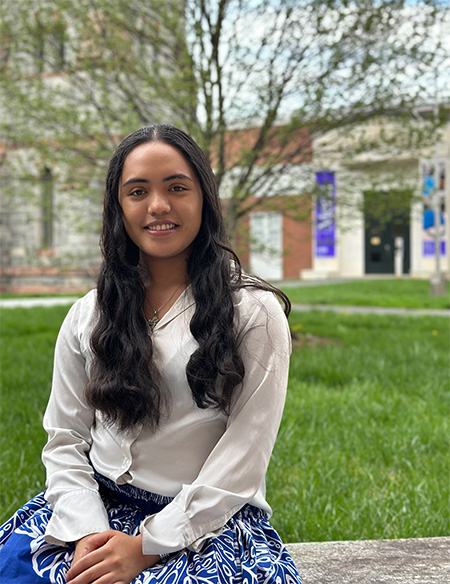In applying for a Udall Scholarship, Roxanne Main ’25 wrote about “the Hawaiian value pono, believing in righteousness and goodness,” noting that she strives to “exemplify pono by applying my ancestral values to present Indigenous issues.”
This year, she is one of 55 college sophomores and juniors—and the first Amherst College student ever—chosen to receive financial support from the Udall Foundation for working to address environmental challenges and issues affecting Native nations.
Main is a Kanaka Maoli (Native Hawaiian) from the Waimānalo reservation on Oahu. “In strong Native Hawaiian communities, there’s still a resistance toward Americanization, because of issues like Ku Kia`i Mauna Kea and Red Hill,” she says. Pursuing a college degree or engaging in scientific research can be discouraged in favor of learning traditional ways to live off the land. Main grew up “trying to find a new way to help my community by finding a bridge between Western education and Indigenous values.”
As a high schooler, she participated in research on how to prevent a fungal disease from killing 'ŌhI'a lehua, an endemic plant that is used in Hawaiian medical practices. Starting in the summer between high school and college, she worked with the University of Hawaiʻi, studying the relationship between a species of mushroom and a type of endemic pine tree and also helping to introduce other Indigenous people to STEM research opportunities.
Main’s bridge-building has continued at Amherst, where she has been active in the Native and Indigenous Students Association, coordinating and publicizing events such as a lei-making workshop and helping to recruit new Native students to the College in conjunction with the EONS program.
When asked which Amherst courses have been most meaningful to her, Main cites American Studies 370: “Indigenous Feminisms,” as well as science classes on “Adaptation & Organism” and “Evolutionary Biology,” where “we went over so many examples from Hawaii,” she says. With support from a Summer Undergraduate Research Fellowship in 2022, she began working with Professor of Geology and Environmental Studies Anna Martini to measure bacterial pollution in a local stream and then build a device that can kill the bacteria using ultraviolet light. “My Waimānalo reservation does not have access to clean water and is unable to grow traditional food,” Main wrote in her Udall application, so “I plan to continue my research into this area and design a battery-powered UV lamp to place in my reservation.”
This summer and fall, Main is studying environmental biology and Indigenous law at the University of Auckland in New Zealand. Her longer-term goal, after graduating from Amherst, is to earn a master’s degree in environmental conservation, quite possibly back home in Hawaii.
“The Hawaiian Kingdom’s national motto is ‘Ua mau ke ea o ka ‘āina i ka pono,’” she points out, then provides a translation: “The life of the land is gained through righteousness.”
